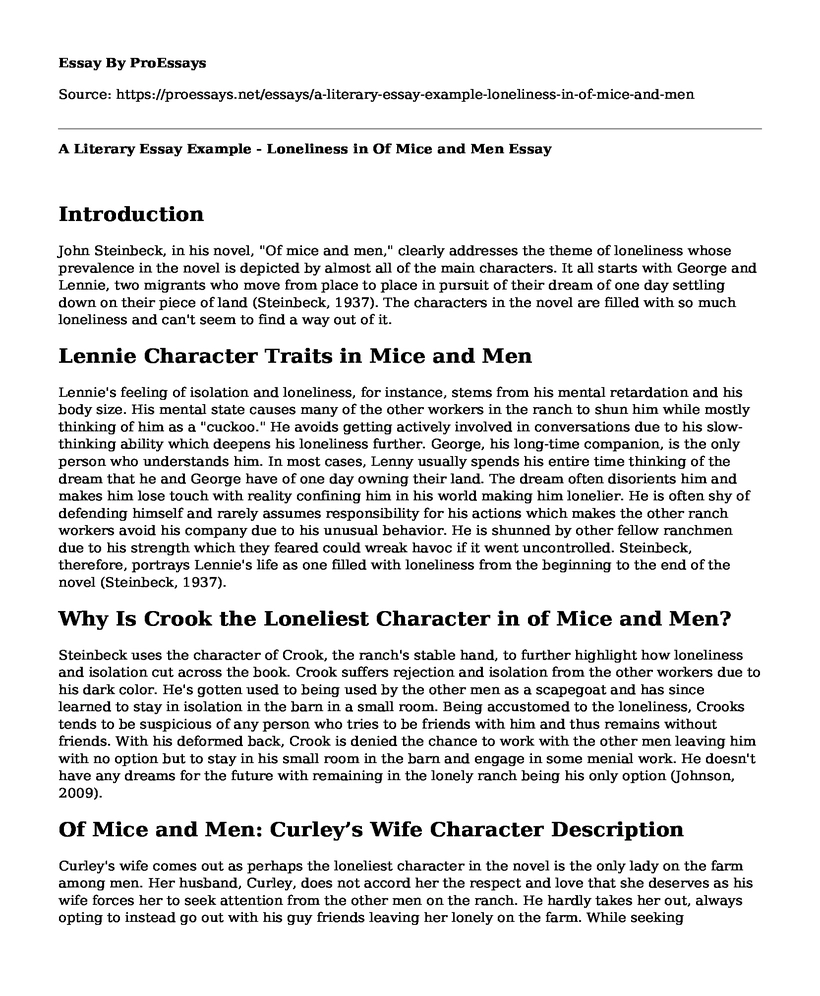Introduction
John Steinbeck, in his novel, "Of mice and men," clearly addresses the theme of loneliness whose prevalence in the novel is depicted by almost all of the main characters. It all starts with George and Lennie, two migrants who move from place to place in pursuit of their dream of one day settling down on their piece of land (Steinbeck, 1937). The characters in the novel are filled with so much loneliness and can't seem to find a way out of it.
Lennie Character Traits in Mice and Men
Lennie's feeling of isolation and loneliness, for instance, stems from his mental retardation and his body size. His mental state causes many of the other workers in the ranch to shun him while mostly thinking of him as a "cuckoo." He avoids getting actively involved in conversations due to his slow-thinking ability which deepens his loneliness further. George, his long-time companion, is the only person who understands him. In most cases, Lenny usually spends his entire time thinking of the dream that he and George have of one day owning their land. The dream often disorients him and makes him lose touch with reality confining him in his world making him lonelier. He is often shy of defending himself and rarely assumes responsibility for his actions which makes the other ranch workers avoid his company due to his unusual behavior. He is shunned by other fellow ranchmen due to his strength which they feared could wreak havoc if it went uncontrolled. Steinbeck, therefore, portrays Lennie's life as one filled with loneliness from the beginning to the end of the novel (Steinbeck, 1937).
Why Is Crook the Loneliest Character in of Mice and Men?
Steinbeck uses the character of Crook, the ranch's stable hand, to further highlight how loneliness and isolation cut across the book. Crook suffers rejection and isolation from the other workers due to his dark color. He's gotten used to being used by the other men as a scapegoat and has since learned to stay in isolation in the barn in a small room. Being accustomed to the loneliness, Crooks tends to be suspicious of any person who tries to be friends with him and thus remains without friends. With his deformed back, Crook is denied the chance to work with the other men leaving him with no option but to stay in his small room in the barn and engage in some menial work. He doesn't have any dreams for the future with remaining in the lonely ranch being his only option (Johnson, 2009).
Of Mice and Men: Curley’s Wife Character Description
Curley's wife comes out as perhaps the loneliest character in the novel is the only lady on the farm among men. Her husband, Curley, does not accord her the respect and love that she deserves as his wife forces her to seek attention from the other men on the ranch. He hardly takes her out, always opting to instead go out with his guy friends leaving her lonely on the farm. While seeking companion from the other men on the ranch, she faces utmost rejection from them for fear of losing their jobs if they were ever caught having any association with her. It thus reaches a point where loneliness takes the best of her, and she starts fantasizing about herself as an actress just to feel more loved and appreciated (Steinbeck, 1937).
Conclusion
Lennie's death closes the novel with a lonely mood as George is now left to go through the rest of the journey without his long-time companion and friend. The dream that they would have a future in which they would experience independence and appreciation became completely shuttered (Steinbeck, 2009).
Works Cited
Johnson, Charles. Reading the character of Crooks in Of Mice and Men: a black writer’s perspective. na, 2009.
Steinbeck, John. "Of mice and men. 1937." Of Mice and Men & Cannery Row (1993).
Cite this page
A Literary Essay Example - Loneliness in Of Mice and Men. (2021, Apr 09). Retrieved from https://proessays.net/essays/a-literary-essay-example-loneliness-in-of-mice-and-men
If you are the original author of this essay and no longer wish to have it published on the ProEssays website, please click below to request its removal:
- Self Versus Collective Interest in British Politics as Portrayed in the Lord of Flies Essay
- Essay Sample on Medusa as a Powerful Creature
- Characteristics of Ghazal in Hustle by Jericho Brown Essay Example
- Principles of Literary Study for Poetry Paper Example
- Literary Analysis Essay on Symbolism in Orwell's 1984
- Essay Example on the Black Death: The Unprecedented Impact on Florence
- Paper Example on Living in Between: Lahiri's Struggle to Balance Indian & American Identities







